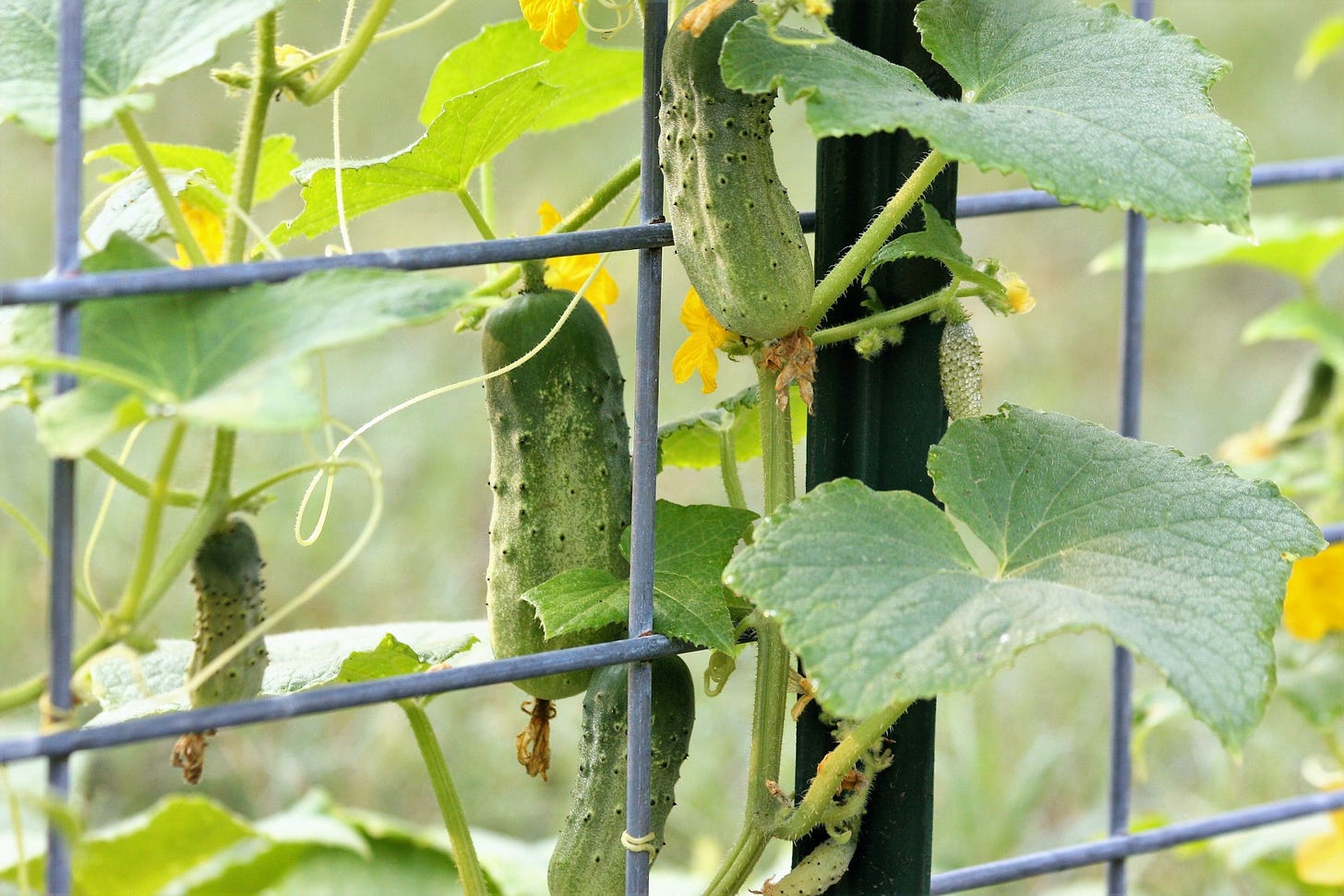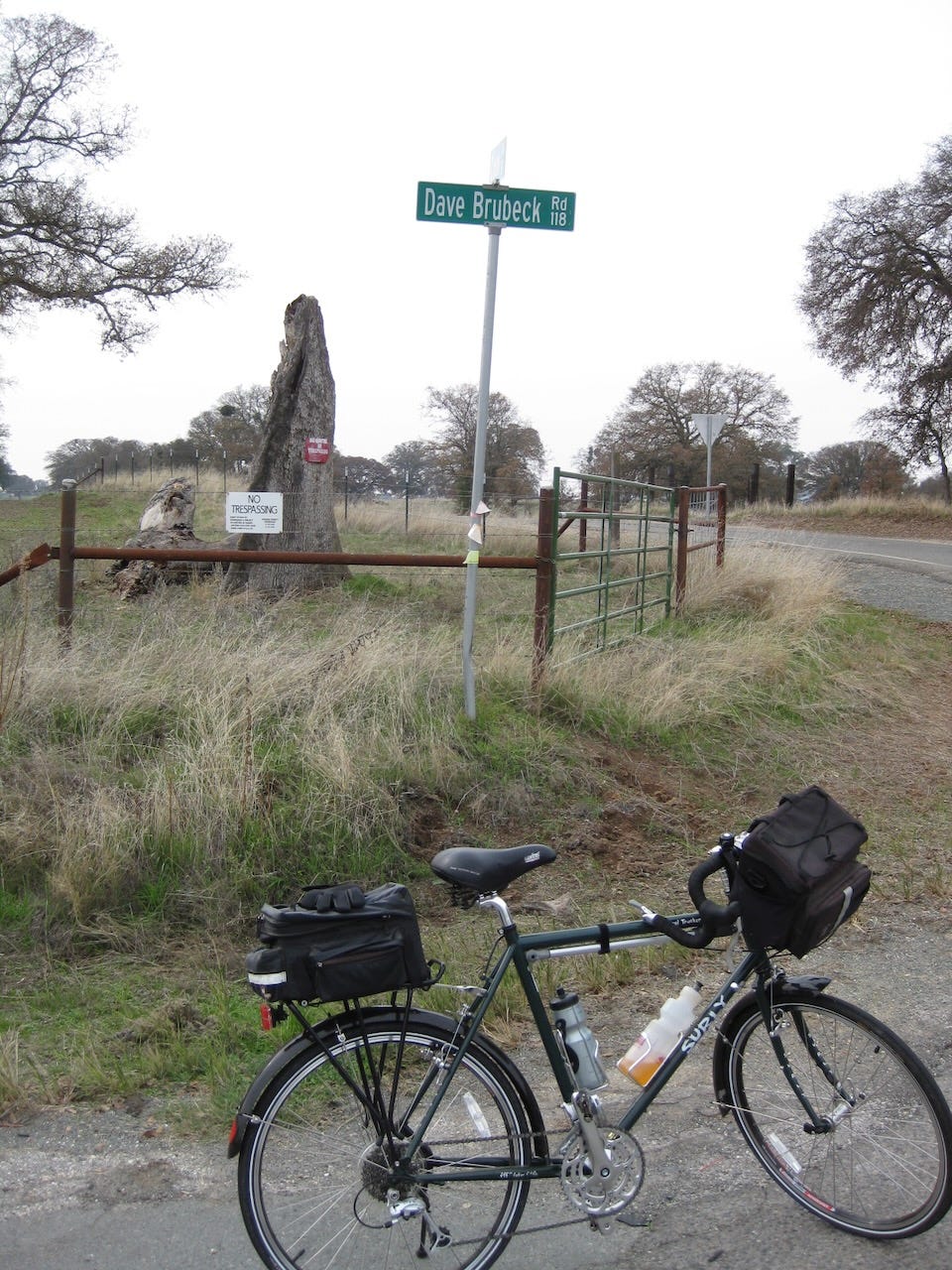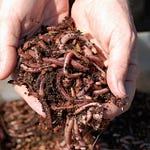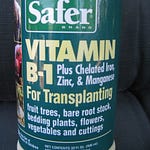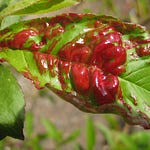Today’s newsletter podcast (above) features Master Gardener/Vegetable Expert Gail Pothour, discussing her favorite cucumber varieties, as well as tips and tricks for their success. Originally featured in Episode 263 of the Garden Basics with Farmer Fred podcast, in which we talked about the Top 5 favorite homegrown vegetables, according to the National Gardening Association. According to the NGA, cucumbers are the second most popular crop for home gardeners. Number One? Tomatoes, of course. A transcript of our conversation with Gail about cucumbers can be found towards the bottom of this newsletter. Meanwhile…
Tackling Summer Cucumber Issues
Last week we tackled the topic of poor pollination of summer squash plants. The lack of late spring zucchini fruit production is usually due to uncooperative weather, a lack of bee activity, or erratic coordination of the development of the male and female flowers of those vines. This week, we turn our attention to a close relative of summer squash, cucumbers. Cucumbers are the second most popular homegrown vegetable (after tomatoes), according to the National Gardening Association. And sure enough, many gardeners are fretting now about these summertime princes of the pickling world.
We asked our favorite retired college horticulture professor, Sacramento-based Debbie Flower, about the primary needs for growing cucumbers successfully. She says freshness, warmth and water are at the top of the list.
“The soil needs to be moist, not wet, but moist, all the time,” explains Flower. “Cucumbers are a warm season plant, a warm season annual. They need soil temperatures to be quite warm when you seed them. And you typically want to direct seed them, not start them from transplants ahead of time. They get root bound while in a container, it dwarfs them. They will never grow very big. If you do that once in your gardening life, you’ll remember it. It's such a disappointment.
“I just tried my second time planting my cucumber seeds. I had planted some old seeds a few weeks ago and that might have been my problem. In general, you don't want to keep cucumber seeds more than two years. And these were two-year-old seeds. Even though I stored them correctly, in the refrigerator over those two years, they just didn't germinate. So yesterday I planted fresh seed. I would advise starting with fresh seed, plant them directly into the garden when your night temperatures have settled at 50 to 55 degrees Fahrenheit or greater. They need six to eight hours of sun, that's considered full sun. They need well drained, fertile soil and regular moisture.”
Cucumbers are natural climbers and are less prone to rot issues and diseases when grown vertically. Training them up one or two heavy-duty, 6-gauge metal livestock panels to support the cucumbers eases harvesting chores.
Cucumbers can also be grown in large containers, 18-24” deep. According to the Santa Clara County Master Gardeners: 18" to 24" deep containers (such as half-barrels or livestock watering troughs) can be used for deep-rooted vegetables such as tomatoes, potatoes, zucchini, winter squashes, beans, corn, cucumbers.
Solving Cucumber Bitterness
A very bitter gardener wrote to us recently: “I have never managed to grow vigorous cucumber vines, and the cucumbers themselves are often bitter. I've heard many explanations for this, including lack of water, weather that is too hot and weather that is too cold. What is the truth?”
We solicited the advice of three University of California cucumber experts about controlling bitterness. All had similar answers.
• Select the newer hybrid varieties, which have been bred to reduce the cause of the bitterness. That’s according to Dennis Pettinger, longtime UC Cooperative Extension Environmental Horticulturist. He adds, “If the cucumbers express bitterness, it can usually be eliminated by peeling away the skin and outer flesh and removing the stem end.”
• According to the Contra Costa County Master Gardeners, the newer cucumber varieties that have been bred to be less bitter include Diva, Sweet Success, Cool Breeze, Summer Dance, Improved Long Green, Eversweet, Ashley, Sunnybrook, Saticoy Hybrid, and Lemon.
• Plant cucumbers in full sun and adjust your watering with the weather to reduce plant stress. El Dorado County Master Gardener Kathy Ruiz writes, “Cool temperatures and shady sites seem to trigger bitterness in cucumbers. Research notes that temperature variations of more than 20 degrees, moisture stress and storage on the vine too long or near other ripening vegetables also can cause bitterness.”
• Again, moisture consistency is key. UC Master Gardener Chantal Guillemin of Contra Costa County writes: “Since cucumbers require ample and regular irrigation during their growing period, add mulches, composted green waste or manure to the soil to increase the soil’s water-holding capacity and supply nutrients to the plants.” Compost or well-aged manures should be mixed into the soil well before planting. Then, top the area with several inches of coarse mulch after planting. Chipped or shredded tree limbs are ideal for mulch.
PODCAST TRANSCRIPT: Growing Cucumbers, with Gail Pothour - Master Gardener
Farmer Fred: So let's move on, on our 10 most popular homegrown garden vegetables. Number two, and I will tell you right off, I don't eat it so I don't grow it. I hope you have, and you can tell us all about cucumbers.
Gail Pothour: Well, my husband won't eat them. So I grow them rarely at home, I am actually going to grow two of my favorites this year. One is called “Green Fingers” and the other is “Silver Slicer”. And “Silver Slicer” is a white, kind of off white cucumber that is very crisp and juicy. It's great. Green Fingers is a hybrid variety. It's small, like baby cucumbers. So you pick them when they're little. And they are never bitter. So it's really good. And then, if I'm going to make pickles, I like to grow “Alibi”. That's a hybrid pickling cucumber. For planting cucumbers, we won’t plant them in our area, probably for several more weeks, they like to have really warm soil, you know, probably in about, you know, a couple three weeks, we should hit 70 degrees. 65 or 70 degrees. for the soil. And that's when we'll plant.
Farmer Fred: Remember, we're talking soil temperature here. And right now, even here in sunny California, we had one of the coldest wettest winters ever. Our soil temperatures are just starting to get into the upper 50s to low 60s. And it'll be a while before it gets into the 70s, which is prime growing conditions for those roots to really shift into high gear and start production. It could easily be June.
Gail Pothour: Yeah, and cucumbers are something that you can plant all through the summer here. They grow fairly quickly, they produce quickly. So you don't have to start early in April or in early May, late April or early May. Wait until the soil temperature has warmed up and the nighttime temperatures are not so cold. You can start them in May, June, July and still get a good crop. You can either direct sow cucumbers or you could do transplants. But remember, they don't like to have their roots disturbed. So what I do, because I do transplants primarily because I have critters around my yard that like to eat the seedlings when they come up, I will start them about three weeks before I want to transplant them out. They grow quickly. I do seeds in a four inch pot and transplant them directly from that pot. Make sure they're not root bound. So if you buy a transplant at the nursery or garden center, be sure it's not root bound.
Farmer Fred: And the easiest way to do that is to flip the pot over. If you see roots coming out the drain holes on that little container, put it back and go look for another one.
Gail Pothour: Yep. And cucumbers can be trained up a trellis so you don't need to use up a lot of real estate in your garden. Grow them up a trellis and it makes for straighter fruits and you get better air circulation that way as well.
Farmer Fred: According to the Vegetable Research Information Center at UC Davis, some of the varieties they recommend for containers (which would indicate they have a smaller growth habit): Pickle Bush, Bush Champion, Parks Bush Whopper, Salad Bush, and Spacemaster. All are rated as suitable for containers. But you're right. Most cucumbers need some training if you're going to be planting them.
Gail Pothour: And they say, by trellising, you can plant more in a smaller space because they're not sprawling all over the ground. They still need to be spaced well enough so that you can get good air circulation. A lot of the crops in that cucurbit family can get powdery mildew, so you want to have good air circulation.
Farmer Fred: Alright, if you like cucumbers, you can plant them, they're easy to grow. And then the good news, like you mentioned, is they grow easily from seed directly sown in the garden. How far apart would you space the seeds?
Gail Pothour: Well, if I was going to train them up a trellis, I would probably grow them a couple feet apart. If you're not going to do them in a trellis, people typically do them in a hill, I have not grown them in hills, but you would plant several in the hill and then thin them to 2 plants. I would probably do them three or four feet apart, I want to get plenty of air circulation, if they're sprawling if they're not grown up.
Farmer Fred: Probably one of the biggest complaints you might hear about cucumbers is bitterness. And they can experience bitterness, especially those that they've grown for fresh use or for pickling. And that's due to the formation of some compounds that impart a bitter flavor to seedlings, roots, stems, leaves and fruit. And one of the easiest ways, according to the University of California Davis, the easiest way to control the bitterness is basically to cut off the end and the skin on that end. And that can help control the bitterness.
Gail Pothour: Yeah, and those compounds you're talking about, and I've been wanting to say this all day, is cucurbitacins. And that's the compound that does make the fruit bitter. It's also the compound that attracts cucumber beetles. So I know that they're trying to breed cucumbers that don't have those compounds in them, so the cucumber beetles won't be attracted to them. But there are some varieties you can grow that are reliably not bitter. So an Armenian cucumber is one (which by the way, is actually a melon), lemon cucumbers and any of them that are Persian. Those tend to not be bitter.
Farmer Fred: Also avoid growing cucumbers in cool or shaded locations. They need regular moisture, too, as well as regular fertilization. And usually if you choose the new hybrid varieties, bitterness is much less of a problem. And again, if you do taste a bitter cucumber, try peeling away the skin and the outer flesh and removing the stem end.
Gail Pothour: Yeah, because I think that's where the bitterness tends to accumulate or at least start, is at that stem end. But since I don't grow cucumbers all that often, I haven't experienced bitter cucumbers.
Farmer Fred: Some of the varieties that are also recommended for burpless cucumbers if there is such a thing. “Sweet Slice” is recommended by UC Davis for being burpless
Gail Pothour: My husband would appreciate that. That's why he doesn't eat them.
Farmer Fred: Interesting that they note that burpless cucumbers tend to be long and slender with a tender skin and the bitterness associated with the burp has been removed. Other causes of bitterness in cucumbers include temperature variation of more than 20 degrees, moisture stress, and storage of cucumbers near other ripening vegetables. So it sounds like ethylene gas is an issue.
Gail Pothour: It certainly does.
Thank you for also listening to the Garden Basics with Farmer Fred podcast! It’s available wherever you get your podcasts. Please share it with your garden friends.
Fred Hoffman is also a University of California Cooperative Extension Master Gardener in Sacramento County. And he likes to ride his bike.



